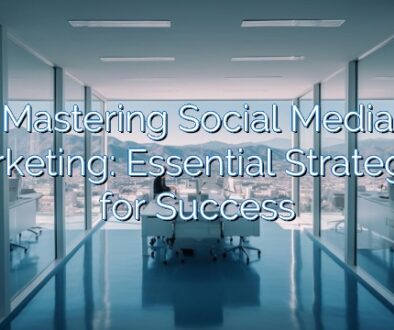Crafting a Winning Business Plan: Key Strategies for Success & Growth
The Importance of a Solid Business Plan
If you’re an SMB owner looking to steer your business toward a future filled with success and growth, the significance of a well-thought-out business plan can’t be overstated. A business plan is a roadmap, guiding every decision and strategic move. It’s more than just a static document; it’s a living framework that evolves with your enterprise. Here, we’ll delve deep into why crafting a winning business plan is crucial for your business pursuits. Let’s start this journey by acknowledging the core components of an impactful plan.
Articulating Your Vision and Mission
Begin with the end in mind. Knowing what you stand for and where you’re headed sets the tone for everything that follows. Establishing a clear vision and mission informs your business objectives, and these statements become the cornerstone that aligns your team and communicates your purpose to stakeholders.
Understanding Your Market
A thorough market analysis is imperative. Who are your customers? What are their pain points? What is the competitive landscape? With AI’s data-driven insights, we can now parse through vast data sets to identify market trends and customer preferences, ensuring every facet of your business plan is geared toward meeting real, identifiable needs.
Defining Your Target Audience
The heart of your business lies with the customers you serve. Identifying your target audience isn’t just about demographics; it is about understanding their behaviors, aspirations, and the unique value your business offers to them. We’ll explore how AI tools can help you to segment and reach out to your ideal customers more effectively.
Competitive Analysis and Differentiation
You must distinguish your brand from the competition to carve out your niche. But how do you truly stand out? A robust competitive analysis augmented by artificial intelligence can reveal gaps in the market that your business is uniquely positioned to fill. Crafting a unique value proposition isn’t just about being different; it’s about being meaningfully different in a way that resonates with your audience.
Leveraging AI for Competitive Advantage
In the age of information, AI is your ally. It provides unparalleled insights into market dynamics, customer preferences, and operational efficiencies. By weaving AI into your business plan, you adopt a futuristic approach that prepares you for trends before they surface. Artificial intelligence isn’t just a buzzword—it’s the linchpin of modern business strategy.
Mapping Out Your Marketing Strategy
No business plan is complete without a comprehensive marketing strategy. In the digital era, this means crafting engaging content, social media campaigns that resonate, and a brand presence that captivates. Knowledge of SEO, or search engine optimization, is paramount to ensuring your message reaches your intended audience.
The Role of SEO in Driving Business Growth
You’ve got an incredible product and a compelling message, but if nobody finds you, do you really exist in the digital market? SEO is the art and science of increasing visibility on search engines. With thousands of searches every second, SEO can be the determining factor that brings potential clients to your virtual doorstep.
Financial Planning and Projections
Detailing your financial plan is more than a necessary evil; it’s an exercise in foresight and feasibility. Your business plan speaks to investors and banks through financial projections, displaying the solid foundation you’re building. With AI-fueled analytics, we can make educated forecasts that reflect a potential future worth investing in.
Utilizing AI for Financial Accuracy and Efficiency
The capability of AI to crunch numbers and predict trends is changing the financial landscape of business planning. AI assists in creating more accurate budget forecasts, financial models, and risk assessments. This precision and efficiency mean that you can plan your financial strategy with a higher degree of confidence.
These strategic considerations are just the beginning. A successful business plan is not only well-rounded and comprehensive but also adaptable. As your business grows and the market shifts, your plan should be revisited and revised—a task made easier with the insights provided by artificial intelligence.
Conclusion: Your Next Steps Forward
Crafting a winning business plan is both an art and a science. By integrating these key strategies with your unique vision and leveraging advanced tools like AI, you set up your business for success and growth. But don’t stop here—take action. Start by booking a 15-minute call with Alex Casteleiro to discuss your business plan and how Nuconet.com can foster your path to triumph. The journey of a thousand miles begins with a single step, which could be yours.
Frequently Asked Questions
How often should I update my business plan?
Business plans should be living documents, reviewed and updated at least annually or whenever significant changes in the market or your business occur. AI tools can provide ongoing insights to inform these updates.
Can AI really help small businesses, or is it suited for large corporations?
AI technology has become increasingly accessible, offering affordable and scalable solutions for businesses of all sizes, including SMBs. It’s a powerful tool for gaining insights and improving operations for any business.
What’s the most critical component of a business plan?
While all sections are important, the executive summary is crucial as it provides a snapshot of your entire business plan. It’s often the first part read by stakeholders, so it should be compelling and concise.
How detailed should my market analysis be in my business plan?
Your market analysis should be detailed enough to prove there is a demand for your product or service and identify your target customer. It should also analyze competitors and market trends.
How can AI improve customer relationship management?
AI can enhance CRM by providing insights into customer behaviors, personalizing interactions, automating responses, and predicting customer needs, ultimately improving customer satisfaction and retention.
[ad_2]




